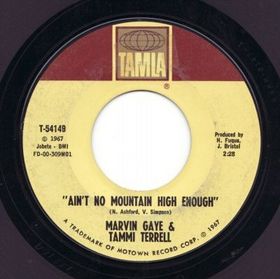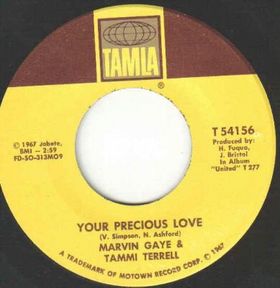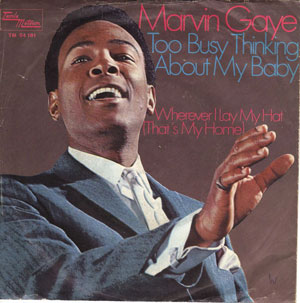Related Research Articles

"I Heard It Through the Grapevine" is a song written by Norman Whitfield and Barrett Strong for Motown Records in 1966. The first recording of the song to be released was produced by Whitfield for Gladys Knight & the Pips and released as a single in September 1967. It went to number one on the Billboard R&B Singles chart and number two on the Billboard Pop Singles chart and shortly became the biggest selling Motown single up to that time.

"Ain't No Mountain High Enough" is a song written by Nickolas Ashford & Valerie Simpson in 1966 for the Tamla label, a division of Motown. The composition was first successful as a 1967 hit single recorded by Marvin Gaye and Tammi Terrell, and became a hit again in 1970 when recorded by former Supremes frontwoman Diana Ross. The song became Ross's first solo number-one hit on the Billboard Hot 100 chart and was nominated for the Grammy Award for Best Female Pop Vocal Performance.

"I Want You" is a song written by Leon Ware and Arthur "T-Boy" Ross and performed by American singer and songwriter Marvin Gaye. It was released as a single in 1976 on his fourteenth studio album of the same name (1976) on his Tamla label. The song introduced a change in musical styles for Gaye, who before then had been recording songs with a funk edge. "I Want You", among other similar songs, gave him a disco audience. Ware, who produced the song alongside Gaye, also was attributed with the single's success.

"Your Precious Love" is a popular song that was a 1967 hit for Motown singers Marvin Gaye and Tammi Terrell. The song was written by Nickolas Ashford and Valerie Simpson, and produced by Harvey Fuqua and Johnny Bristol. The doo-wop styled recording features background vocals by Fuqua, Gaye, Terrell and Bristol, and instrumentals by The Funk Brothers with the Detroit Symphony Orchestra. The song peaked at #5 on Billboard Pop Singles chart, #2 on Billboard's R&B Singles chart, and the top 40 on Billboard's Easy Listening survey. The song was later sampled by Gerald Levert on the song, "Your Smile", on his 2002 album, The G Spot.

"You're All I Need to Get By" is a song recorded by the American R&B/soul duo Marvin Gaye and Tammi Terrell and released on Motown Records' Tamla label in 1968. It was the basis for the 1995 single "I'll Be There for You/You're All I Need to Get By" from Method Man and Mary J. Blige.

"Ain't Nothing Like the Real Thing" is a 1968 single released by American R&B/soul duo Marvin Gaye and Tammi Terrell, on the Tamla label in 1968. The B-side of the single is "Little Ole Boy, Little Ole Girl" from the duo's United LP. The first release off the duo's second album: You're All I Need, the song—written and produced by regular Gaye/Terrell collaborators Ashford & Simpson—became a hit within weeks of release eventually peaking at number eight on the US Billboard Hot 100 and number one on the Hot Soul Singles chart, the first of the duo's two number-one R&B hits. In the UK "Ain't Nothing Like the Real Thing" reached number 34.

"Ain't That Peculiar" is a 1965 song recorded by American soul musician Marvin Gaye for the Tamla (Motown) label.

"Pride and Joy" is a 1963 single by Marvin Gaye, released on the Tamla label. The single, co-written by William "Mickey" Stevenson, Gaye and Norman Whitfield, and produced by Stevenson, was considered to be a tribute to Gaye's then-girlfriend, Anna Gordy. The album version of the single featured on Gaye's second album, That Stubborn Kinda Fellow is different in parts to the single version presenting a more jazz effect than the gospel-emulated version that became a single. The song was also Gaye's first top ten pop single peaking at number ten on the chart and just missed the top spot of the R&B singles chart peaking at number two. The song also helped continue Gaye's successful hit streak as the singer would score another Top 40 pop hit at the end of that year with "Can I Get a Witness".

"Too Busy Thinking About My Baby" is a Motown song written by Norman Whitfield, Barrett Strong, and Janie Bradford. The song was first recorded by The Temptations as a track on their 1966 album Gettin' Ready. Eddie Kendricks sings lead on the recording, which was produced by Whitfield. Jimmy Ruffin also recorded a version with The Temptations providing background vocals in 1966. It remained unreleased until 1997.
"Stubborn Kind of Fellow" is a 1962 song recorded by Marvin Gaye for the Tamla label. Co-written by Gaye and produced by William "Mickey" Stevenson, "Stubborn Kind of Fellow" became Gaye's first hit single, reaching the top 10 of the R&B chart and the top 50 of the Billboard Hot 100 in late 1962.

"Abraham, Martin and John" is a 1968 song written by Dick Holler. It was first recorded by Dion, in a version that was a substantial North American chart hit in 1968–1969. Near-simultaneous cover versions by Smokey Robinson and the Miracles and Moms Mabley also charted in the U.S. in 1969, and a version that same year by Marvin Gaye became the hit version in the UK. It was also a hit as part of a medley for Tom Clay in 1971, and has subsequently been recorded by many other artists.
"You're a Special Part of Me" was a successful duet single for soul singers and Motown label mates Diana Ross & Marvin Gaye, released in 1973. The original duet was one of the few originals featured on their famed album, Diana & Marvin, and was among the most successful of the songs the Motown label mates made reaching #4 on the Billboard R&B Singles chart and #12 on the Billboard Pop Singles chart.

"Who's Sorry Now?" is a popular song with music written by Ted Snyder and lyrics by Bert Kalmar and Harry Ruby. It was published in 1923 as a waltz. Isham Jones had a hit recording in 1923 with the song arranged as a foxtrot. Later sheet music arrangements, such as the 1946 publication that was a tie-in to the film A Night in Casablanca, were published in 2
2 time. Other popular versions in 1923 were by Marion Harris, Original Memphis Five, Lewis James, and Irving Kaufman.

"Heartbeat" is a rockabilly song originally recorded by Bob Montgomery and credited to Norman Petty. It was recorded most famously by Buddy Holly in 1958. The B-side of the single was "Well... All Right". "Heartbeat" reached the UK top 10 twice: once in 1975 for Showaddywaddy at number seven and again in 1992 for Nick Berry, recorded as the theme to the television series Heartbeat, which reached number two.

"Beechwood 4-5789" is a song written by Marvin Gaye, William "Mickey" Stevenson and George Gordy. It was a 1962 hit single for the Motown girl group The Marvelettes on Motown's Tamla subsidiary record label. The song became a hit again when it was covered by the pop duo The Carpenters in 1982.
"California Soul" is a funk-soul tune written by Ashford & Simpson, issued originally as the B-side of the Messengers' single "Window Shopping" in 1967 under the Motown group of labels.

"All This Love" is a single by DeBarge, released on October 17, 1982. The song was released as the third and final single from their second studio album of the same title on the Gordy label. The single would help DeBarge rise to R&B stardom. A cover version of the song was recorded by Patti LaBelle on her 1994 gold album Gems. A video for her version was also filmed.

"Broken Hearted Me" is a song written by Randy Goodrum, originally recorded by England Dan & John Ford Coley for their album Dr. Heckle and Mr. Jive, and later covered by Canadian country and pop music singer Anne Murray. It was released in September 1979 as the first single from her album I'll Always Love You. The song reached No. 1 on the Billboard Hot Country Singles chart in December, Murray's fourth No. 1 single on that chart. She also recorded a version of the song in Spanish, which was released on vinyl, and later on CD.
"Breakin' in a Brand New Broken Heart" is a popular song written by Howard Greenfield and Jack Keller.

"How Sweet It Is (To Be Loved by You)" is a song recorded by American soul singer Marvin Gaye from his fifth studio album of the same name (1965). It was written in 1964 by the Motown songwriting team of Holland–Dozier–Holland, and produced by Brian Holland and Lamont Dozier. The song title was inspired by one of the actor and comedian Jackie Gleason's signature phrases, "How Sweet It Is!"
References
- 1 2 Whitburn, Joel (2000-11-01). The Billboard Book of Top 40 Hits (7th Rev. ed.). New York: Watson-Guptill Publications. ISBN 978-0-8230-7690-1.
- ↑ Whitburn, Joel (1973). Top Pop Records 1940-1955. Menomonee Falls, Wisconsin: Record Research.
- ↑ Lonergan, David (2004-01-28). Hit Records 1950-1975. Lanham, Maryland: Scarecrow Press. ISBN 978-0-8108-5129-0.